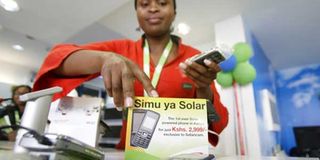Why you need solar gadgets

Solar-charged mobile phone handsets for display at a retail centre. There are other solar-powered appliances such as refrigerators, water pumps and water heaters, which also come in handy for those either in rural areas, or in places where electricity supply is erratic. PHOTO | FILE
What you need to know:
- There are other solar-powered appliances such as refrigerators, water pumps and water heaters, which also come in handy for those either in rural areas, or in places where electricity supply is erratic. But solar power is not just for the off-grid users.
- The ERC’s preliminary nationwide audits show that only 150,000 of three million buildings (both old and new) have installed hot water systems – leaving thousands in the regulator’s crosshairs.
- The cost of a complete solar water heater system for domestic use ranges between Sh125,000 and Sh150,000 per unit and between Sh600,000 and Sh2 million for commercial buildings.
Two years ago, Zakariah Mondo, 37, a secondary school teacher, was transferred from Nairobi to Mwea in Kirinyaga County. Aware that his village was not connected to the national grid, Mr Mondo bought and installed a solar panel, which he used to power his flat-screen television and to light up the house.
“The problem was that we wouldn’t watch TV during the day to in order to save power, but even at night the available energy could power the TV for only 30 minutes,” he laments.
“When you are here in the village, you feel cut off from the rest of the world, especially if you cannot follow the news,” he adds.
Tired of ‘living in the dark’, Mondo bought a solar panel that comes with a solar flat-screen TV and lamps, and has been watching TV without power interruption since.
Doris Wambui, a former prison warder in Thika who retired to her home in Mwea, experienced similar frustrations.
“After retiring about five years ago, I decided to return to the village. I found it hard to copewithout electricity. Electricity allows you to use many gadgets,” explains the mother of six.
To make life easier, she bought a solar panel that comes with four lamps and a radio.
SOLAR HEATING SYSTEMS
“Because we are still building our new house, we don’t have the money to buy a solar-powered TV, but we have a radio so we catch up on all the important developments in national politics as well as farming tips,” says Ms Wambui, now a farmer.
She used to buy lamps with rechargeable batteries but it became difficult to recharge them. Besides, their strength would wane with time.
Mr Mondo and Ms Wambui are among an increasing number of Kenyans who are using solar-powered appliances to make their lives easier.
There are other solar-powered appliances such as refrigerators, water pumps and water heaters, which also come in handy for those either in rural areas, or in places where electricity supply is erratic. But solar power is not just for the off-grid users.
Indeed, the Energy Regulatory Commission (ERC) said that it would begin enforcing the Energy Regulations 2012 (Solar Water Heating) on May 27 this year when the grace period it provided last year ends.
The regulation requires the owners of residential and commercial buildings whose hot water needs exceed 100 litres per day to include solar water heating systems in their building designs.
The ERC’s preliminary nationwide audits show that only 150,000 of three million buildings (both old and new) have installed hot water systems – leaving thousands in the regulator’s crosshairs.
The cost of a complete solar water heater system for domestic use ranges between Sh125,000 and Sh150,000 per unit and between Sh600,000 and Sh2 million for commercial buildings.
Solar panels are becoming increasingly popular around the country as property owners, hoteliers and offices in remote areas turn to the sun’s energy to power their homes.
FREE ENERGY
Paradoxically, many home owners do not enjoy this free source of energy since they fail to include solar electronics in their energy mix.
Experts in the energy sector say that solar power installation should go hand in hand with solar powered electronics for energy efficiency.
Mr Conrad Whitaker, global distributor delivery manager at Azuri Technologies, says they have partnered with Zuku TV to distribute home smart solar systems, which include solar home power, a 24-inch TV and satellite dish at an affordable cost to rural folks. The system comes with four lights, a mobile phone charger and a rechargeable, portable radio.
“The TV set cannot operate with any other source of power apart from the solar panel it came with,” Mr Whitaker points out, adding that the solar home set-up also has a power-saving mode system which ensures that the available energy is used efficiently at all times.
The package costs Sh149 a day but a consumer can own it after paying for two years.
However, they will continue to pay for the satellite service. Top up is via mobile money.
There are several solar solution providers across the country such as M-Kopa and Azuri Technologies that offer pay-go services to solar users.





